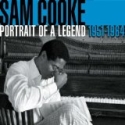
Included as one of the great pioneers, a man who took control of his own career, wrote much of his own material and paved the way for those who followed. He was also undeniably a superb vocalist and a forerunner for many of the talents for whom he both set the standard and broke down the boundaries of a still white dominated record business.
Yet, more than just about any other artist featured in this Primer, it seems there will always be a range of opinion about Sam. For every major plus, there appears to be a minus along the way. Great voice but over produced; gospel roots but Las Vegas cabaret; excellent songwriter but poor choice of material. The inconsistencies are all too apparent, and there is little doubt that he was more than happy to compromise to conquer the pop market.
Cooke was born in Clarksdale, Mississippi. He was one of eight children of Annie Mae and the Reverend Charles Cook, a Baptist minister. The family moved to Chicago in 1933, where Cooke attended Wendell Phillips Academy High School in Chicago, the same school that Nat “King” Cole had attended a few years earlier. Cooke began his career with his siblings in a group called The Singing Children when he was nine but first attracted real attention as lead singer with the Highway QC’s as a teenager, joining at the age of 14. In 1950, Cooke replaced gospel tenor R.H. Harris as lead singer of the gospel group The Soul Stirrers, possibly the leading gospel group of the period. By 1956, he was already being encouraged to record secular material, primarily at the instigation of Bumps Blackwell.
Initially he recorded the pop material under the name Dale Cook, keeping his pop and gospel material as separate as possible. By 1957 and ‘You Send Me’, he already had orchestration and white female backing vocals on his recordings (although the tune was borrowed from gospel). ‘Wonderful World’ and ‘Only Sixteen’ soon followed and regular placings on the pop charts became common place. Still gospel based, the nature of the material (certainly lyrically) was nonetheless at odds with the purity of work recorded by the Soul Stirrers and it was inevitable that Cooke and the group would part company. He still remained actively involved in the group’s career and even suggested Johnnie Taylor as his direct replacement. There are a number of CD compilations around which cover Cooke’s work with the Soul Stirrers.

In 1960 Cooke signed with RCA and the hits really started flowing – they include ‘Chain Gang’, ‘Twistin’ The Night Away’, ‘Another Saturday Night’, ‘Shake’ and ‘Bring It On Home To Me’. For every classic early soul performance, there was a nod towards the supper club circuit with such novelties as ‘Everybody Loves To Cha Cha Cha’ – even the high quality stuff was at times overproduced. Cooke’s exceptional ability nearly always overcame such difficulties and he set the standard for the sweet soul music later typified by the recordings of the likes of Al Green, Luther Vandross and even Smokey Robinson. Everyone could always see beyond the superficial production values to the immense talent of the man himself; Otis Redding was one of Sam’s biggest admirers and recorded a number of Cooke compositions.
Most of the necessary Cooke recordings can be found on the “Portrait Of A Legend” which oversees the range of his career, beginning with the Soul Stirrers rendition of ‘Touch The Hem Of His Garment’ through to ‘A Change Is Gonna Come’. However, this can be tricky to get hold of and is sometimes a little expensive. If so, there is a cheap 3CD compilation “The Singles Collection“, which is reasonable, but doesn’t have the Soul Stirrers hit or ‘A Change Is Gonna Come’, probably his best recording. “Hits” is another fair compilation, but still with critical songs omitted.
A great vocalist and stylist, he moved black music into the mainstream and was also one of the earliest performer / writers working in the soul tradition – to that extent, he was a prime early mover in the soul/R&B artist’s struggle to begin to control his own destiny. If you can listen to the performance of his own ‘A Change Is Gonna Come’ and fail to be moved by it, then you probably aren’t that interested in the emotional pull of the best of R&B – you might not even have a pulse!! He died of gunshot wounds inflicted in a Los Angeles hotel in extremely murky circumstances; despite the controversy around his death however, his reputation has deservedly continued to grow ever since and his importance and the sheer enjoyment of his music should not be underestimated.
